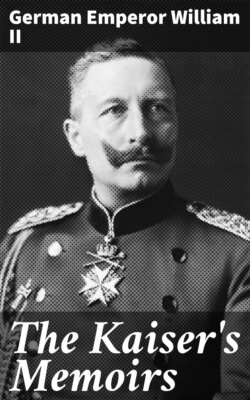Читать книгу The Kaiser's Memoirs - German Emperor William II - Страница 14
На сайте Литреса книга снята с продажи.
HE BECOMES EMPEROR
ОглавлениеTable of Contents
After Emperor Frederick III had closed his eyes forever, the heavy burden of governing the Empire fell upon my youthful shoulders. First of all I was confronted with the necessity of making changes in the government personnel in various quarters. The military entourage of the two emperors, as well as the body of officialdom, had grown too old. The so-called "maison militaire" (military household of Emperor William the Great) had been retained in its entirety by Emperor Frederick III, without being required to discharge military duties. In addition, there was the entourage of Emperor Frederick III. I proceeded to dismiss, in the friendliest way, all those gentlemen who wished to go into retirement; some of them received positions in the army, a few of the younger remained in my service for the transition period.
During the ninety-nine days, while I was still Crown Prince, I had silently concerned myself with those personages to whom I proposed later to give appointments, since the physicians had left me no doubt that my father had only a short time to live. I ignored court or external considerations; nothing but previous achievements and character moved me to my choice. I did away with the term "maison militaire" and transformed it into "Main Headquarters of His Majesty." In choosing my entourage I took the advice of only one man in whom I reposed special confidence, my former chief and brigade commander, General—afterward Adjutant General—von Versen, a man of straightforward, knightly, rather harsh character, an officer of the old Prussian school, a typical chip of the old block. During his military service in line and guard regiments he had noted with an observing eye the court influences and tendencies which had often worked to the disadvantage of the officer corps in the old "maison militaire." In this direction the circle of ladies of high position, jokingly known among the officers as "trente et quarante" on account of their age, also played a certain part. I wished to eliminate such influences.
I appointed General von Wittich my First Adjutant General and General von Hahnke, commander of the Second Infantry Guard Division, chief of my Military Cabinet. The latter was a friend of Emperor Frederick III and, while I was still serving with the First Infantry Guard Regiment, he was my brigade commander. These two were men of military experience and iron principles, who shared absolutely the sentiments of their master, and remained bound to me to the end of their lives by the most exemplary fidelity.
As the head of my court I appointed a man known to me from his youth, the former Court Marshal of my father, Count August Eulenburg, who remained at the head of the Ministry of the Royal House until his death in June, 1921, at the age of eighty-two years. He was a man of fine tact, uncommon ability, clear insight in court as well as political matters, sincere character, and golden fidelity to his King and his King's family. His manifold abilities would have enabled him, to the same degree that they had made him known as Court Marshal throughout Europe, to act with equal success as ambassador or as Imperial Chancellor. Working with unswerving zeal, endowed with winning politeness, he stood by me with helpful counsel in many matters—dynastic, family, court, public life. He had to do with many men, in all social strata and all walks of life, by all of whom he was revered and esteemed, and he was treated by me likewise with friendship and gratitude.
